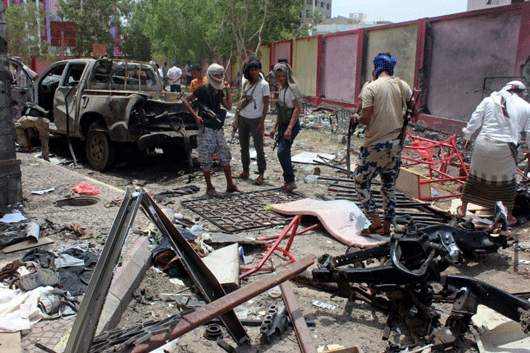
Local Editor
A suicide car bombing claimed by the Islamic State group [or ISIS] in Yemen’s southern city of Aden on Monday killed at least 54 pro-regime recruits, officials said.
The men were at a staging area near two schools and a mosque when a pickup truck suddenly accelerated through the building’s gate as a food delivery arrived, exploding amid the crowd, witnesses said.
"Bodies and body parts are scattered all over the place," said Mohammed Osman, a neighbor who rushed to the scene. "It was a massacre," he said.
The death toll steadily rose through the day and by mid-afternoon, the director of Aden’s Health Ministry, Khidra Lasour, said 54 had died from the explosion. Almost 70 people were wounded, including 30 seriously, and were being treated in area hospitals.
Security officials, speaking on condition of anonymity, identified the bomber as one Ahmed Seif, distributing a photo of him smiling and holding an assault rifle next to a flag used by extremist militants as well as a rocket-propelled grenade launcher.
The recruits were signing up to join a new unit the Saudis hope will ultimately be made up of 5,000 fighters. After some training, the new force will deploy to the Saudi cities of Najran and Jizan, near the border with Yemen, the officials said.
Aid group Doctors Without Borders reported on social media that their hospital in Aden had received 45 dead.
The IS-run Aamaq news agency said the attack was carried out "by a fighter from the Islamic State who targeted a recruitment center." Later, another statement circulated by IS called the bomber a "knight" who had purportedly killed some 60 coalition fighters.
Ahmed al-Fatih, who had been working at the center, said security at the site was lax.
"There was no consideration of security," he said. "So it was easy for Al-Qaeda or Daesh to pull off such an act," he added, using an Arabic acronym to refer to the Islamic State group.
The U.N. and rights groups estimate that at least 9,000 people have been killed since fighting escalated in Yemen in March 2015 with the start of Saudi-led airstrikes targeting the Houthis and their allies. Some 3 million people have been displaced inside the country, the Arab world’s poorest.
U.N.-mediated peace talks in Kuwait were suspended earlier this month with no signs of progress.
The Houthis and forces allied to former President Ali Abdullah Saleh took control of Sanaa in September 2014, after resigned Yemeni President Abd Rabbu Mansour Hadi fled the country.
Saudi Arabia began its deadly campaign against Yemen in late March 2015. The strikes were meant to undermine the Houthi Ansarullah movement and restore power to fugitive former president Abd Rabbu Mansour Hadi.
About 10,000 people have been killed and over 16,000 injured since Riyadh launched the airstrikes. The Saudi aggression has also taken a heavy toll on Yemen’s facilities and infrastructure.
Yemeni forces have been engaged in retaliatory attacks against the Saudi forces deployed in the country as well as targets inside Saudi Arabia.
Source: News Agencies, Edited by Website Team